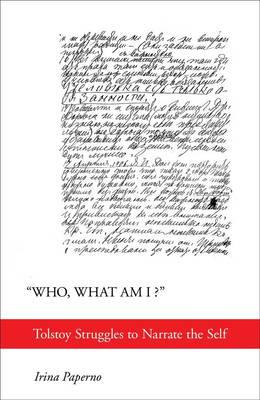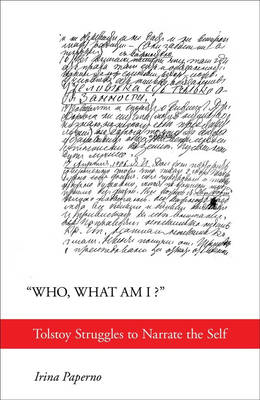
- Afhalen na 1 uur in een winkel met voorraad
- Gratis thuislevering in België vanaf € 30
- Ruim aanbod met 7 miljoen producten
- Afhalen na 1 uur in een winkel met voorraad
- Gratis thuislevering in België vanaf € 30
- Ruim aanbod met 7 miljoen producten
Omschrijving
"God only knows how many diverse, captivating impressions and thoughts evoked by these impressions... pass in a single day. If it were only possible to render them in such a way that I could easily read myself and that others could read me as I do..." Such was the desire of the young Tolstoy. Although he knew that this narrative utopia--turning the totality of his life into a book--would remain unfulfilled, Tolstoy would spend the rest of his life attempting to achieve it. "Who, What Am I?" is an account of Tolstoy's lifelong attempt to find adequate ways to represent the self, to probe its limits and, ultimately, to arrive at an identity not based on the bodily self and its accumulated life experience.This book guides readers through the voluminous, highly personal nonfiction writings that Tolstoy produced from the 1850s until his death in 1910. The variety of these texts is enormous, including diaries, religious tracts, personal confessions, letters, autobiographical fragments, and the meticulous accounts of dreams. For Tolstoy, inherent in the structure of the narrative form was a conception of life that accorded linear temporal order a predominant role, and this implied finitude. He refused to accept that human life stopped with death and that the self was limited to what could be remembered and told. In short, his was a philosophical and religious quest, and he followed in the footsteps of many, from Plato and Augustine to Rousseau and Schopenhauer. In reconstructing Tolstoy's struggles, this book reflects on the problems of self and narrative as well as provides an intellectual and psychological biography of the writer.
Specificaties
Betrokkenen
- Auteur(s):
- Uitgeverij:
Inhoud
- Aantal bladzijden:
- 240
- Taal:
- Engels
Eigenschappen
- Productcode (EAN):
- 9780801453342
- Verschijningsdatum:
- 20/11/2014
- Uitvoering:
- Hardcover
- Formaat:
- Genaaid
- Afmetingen:
- 160 mm x 234 mm
- Gewicht:
- 498 g

Alleen bij Standaard Boekhandel
Beoordelingen
We publiceren alleen reviews die voldoen aan de voorwaarden voor reviews. Bekijk onze voorwaarden voor reviews.











